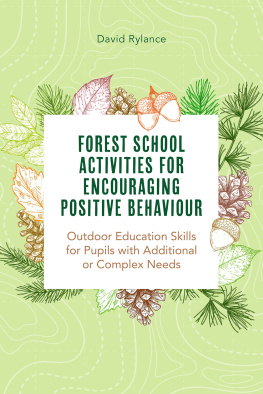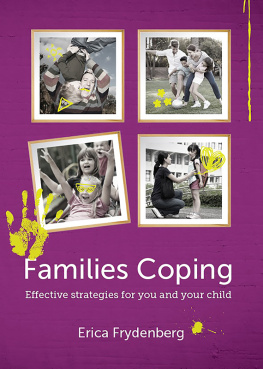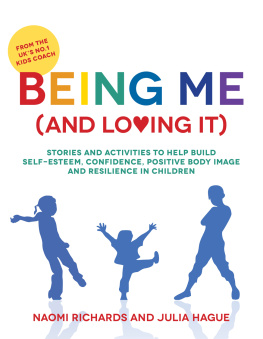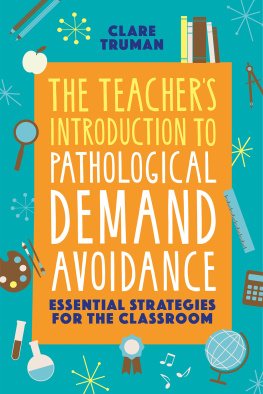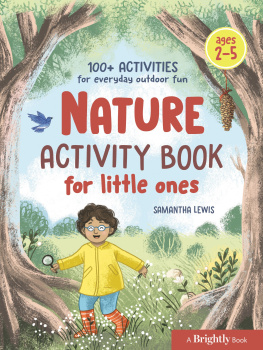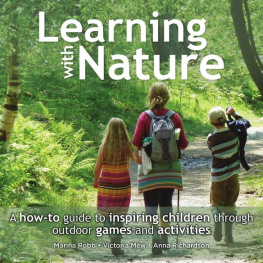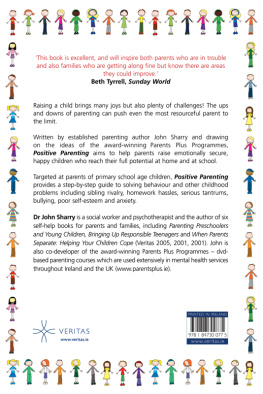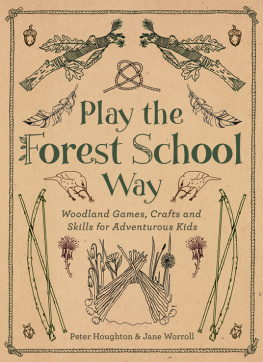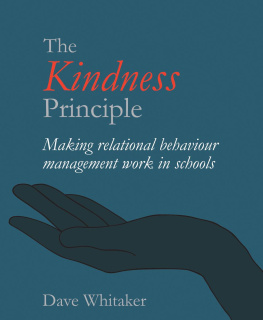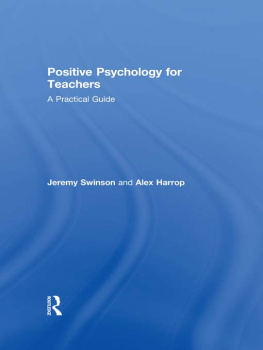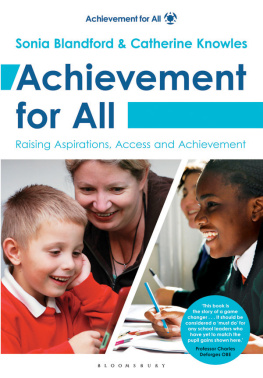Contents
Page list

of related interest
Forest School and Autism
A Practical Guide
Michael James
ISBN 978 1 78592 291 6
e ISBN 978 1 78450 595 0
How to Get Kids Offline, Outdoors, and Connecting with Nature
200+ Creative Activities to Encourage Self-Esteem, Mindfulness, and Wellbeing
Bonnie Thomas
ISBN 978 1 84905 968 8
e ISBN 978 0 85700 853 4
Teaching Social Skills Through Sketch Comedy and Improv Games
A Social Theatre Approach for Kids and Teens including those with ASD , ADHD , and Anxiety
Shawn Amador
ISBN 978 1 78592 800 0
e ISBN 978 1 78450 820 3
Positive Behaviour Management in Primary Schools
An Essential Guide
Liz Williams
ISBN 978 1 78592 361 6
e ISBN 978 1 78450 704 6
FOREST SCHOOL
AND ENCOURAGING
POSITIVE BEHAVIOUR

Outdoor Education Skills for Pupils
with Additional or Complex Needs
David Rylance

First published in Great Britain in 2022 by Jessica Kingsley Publishers
An imprint of Hodder & Stoughton Ltd
An Hachette Company
Copyright David Rylance 2022
The right of David Rylance to be identified as the Author of the Work has been asserted by him in accordance with the Copyright, Designs and Patents Act 1988.
Front cover image source: Freepik.com. The cover image is for illustrative purposes only, and any person featuring is a model.
All rights reserved. No part of this publication may be reproduced, stored in a retrieval system, or transmitted, in any form or by any means without the prior written permission of the publisher, nor be otherwise circulated in any form of binding or cover other than that in which it is published and without a similar condition being imposed on the subsequent purchaser.
A CIP catalogue record for this title is available from the British Library and the Library of Congress
ISBN 978 1 83997 078 8
e ISBN 978 1 83997 079 5
Jessica Kingsley Publishers policy is to use papers that are natural, renewable and recyclable products and made from wood grown in sustainable forests. The logging and manufacturing processes are expected to conform to the environmental regulations of the country of origin.
Jessica Kingsley Publishers
Carmelite House
50 Victoria Embankment
London EC4Y 0DZ
www.jkp.com
CONTENTS
Chapter 1
INTRODUCTION TO THIS BOOK
I t is my hope that you have in your hands a book that will be useful to you in a number of ways. Perhaps most importantly the tips, suggestions and philosophy contained within will mean that you can run a forest school provision where children can benefit from what you (and nature) have to offer, regardless of any additional needs they have. But also, for those of you who are just starting out in forest school, this book will provide a solid foundation from which you can build your provision. What I fervently hope too is that you can find the skills to make your work enjoyable. Working with young people whose behaviour is challenging is tough. I know many teachers and teaching assistants who can find the stress overwhelming. It can chip away at your resilience over time. But the truth is we can all learn how to manage difficult and challenging behaviour with skill and flair, and reduce the stress we feel as a result. That is my chief role when I work as a behaviour consultant with schools and other provisions to move colleagues from I dont know what to do next to a better place.
Forest school is a (relatively) new element to the education approach in the UK and, indeed, wider world. Managing challenging behaviour, however, seems to be an age-old issue! You may be reading this book as a forest school leader who works in a school, perhaps as a teacher or teaching assistant. For you, I can confidently say that you will find much within these pages that will be of value in your forest school provision and other outdoor lessons, but that you will also gain a useful perspective and many strategies and techniques that will be of use to you in the classroom too, with a little adaptation at most.
If you are reading this book as an operator of a privately owned forest school provision, offering a service to schools, youth groups and other organizations, you too will find much to assist you in this role. Many of your customers will appreciate a forest school provider who can cater to special educational needs and disability ( SEND ) and complex needs. The skills contained within these pages will mean you can be assured of an effective approach to support these learners. For your mainstream attendees, you will see how presenting yourself in a certain way can mean you manage poor behaviour by never having any to deal with! And of course, your skills will be appreciated by parents and theyll bring their children back; in my opinion (and parents tell us this), Out There Adventures, where I work, benefits from this. There are many good-quality providers out there, but I also believe that it is often other skills that will make parents come back for more.
If you are a newly qualified forest school leader, then you will already be aware of the ethos around behaviour that is part of the forest school way. You are at the perfect stage of your forest school career to build on and consolidate your skills by reading this book! If you can use even a small number of the skills and techniques within, making them your own, I can tell you that you will be streets ahead of many, many educators and forest school leaders, in my experience. What a great way to start! And remember that when you create an ethos in your forest school that will support the more complex children, then you will also find that you will be supporting all learners to make the best behaviour choices they can.
All forest school leaders should (must) be reflective practitioners, constantly aware and curious, always testing their approaches, always looking for new ones. We all need a high level of awareness, all day. Is there a learning opportunity to grasp? Why is that child doing that? How should I approach this? How can I? You get the picture! So, read on, enjoy the book, reflect on the ideas and skills within and be ready to use them out there in the woods to benefit those children who need, perhaps more than most, what you will have to offer.
About a week before I wrote this part of the book, I was standing in the woods while a nine-year-old threw logs at me, one of which hit me in the head, another in the ribs. His driving issues, I felt, stemmed from a lack of resilience and an obsession with control. My analysis of the situation was that he had realized I was not going to make choices driven by him, and was looking to escalate the situation. I explained to him, in a calm and neutral tone, that I would withdraw my attention from him until he was ready to re-engage. My attention mattered to him only because I was retaining control of it; otherwise, I am fairly sure he couldnt have cared less.
In my head was a single worry that he might force my hand, perhaps by trying to leave the woods, pushing me to intervene, or perhaps try to really hurt himself (he had already been hitting his head against things). I hoped we wouldnt get to that, as I was desperate not to reinforce the message that if adults couldnt be controlled, he could up the ante and then they would cave in. My understanding from talking to his carer was that this was something he had experienced before, and so a negative behaviour choice had been embedded and become habitual, as it had been successful in the past. The boy had grown to like the heady experience of being in charge, even when he was surrounded by adults. Key for me was the mantra that we can have total control over a huge part of an interaction with others, that part being the behaviour choices we make.

